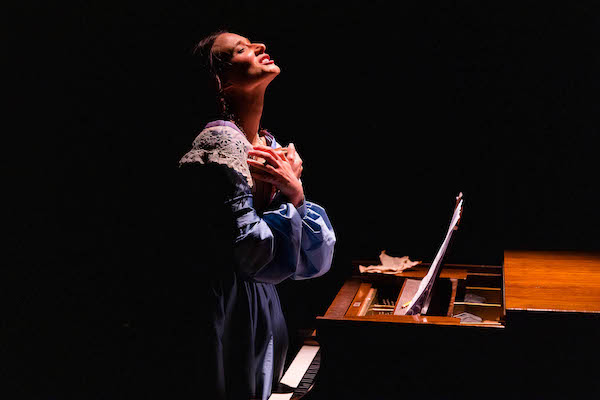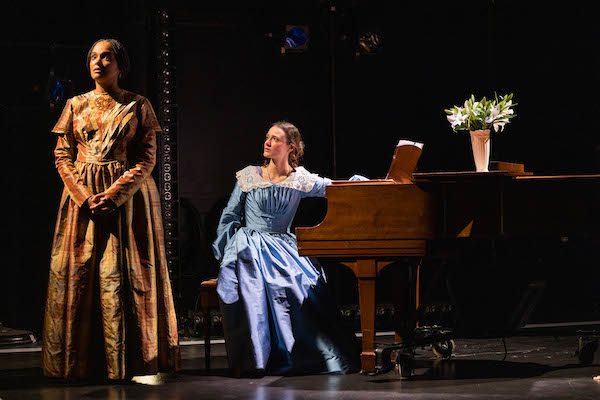Theater Review: “Ada and the Engine” — A Free-Spirited Young Female Math Wiz in Victorian England
By David Greenham
You don’t have to be a math wiz to enjoy Lauren Gunderson’s engaging historical drama, which has been effectively staged by director Debra Wise.
Ada and the Engine by Lauren Gunderson. Directed by Debra Wise. Choreography by Judith Chaffee. Scenic design by Cristina Todesco, costume design by Leslie Held, lighting design by John Malinowski, sound design by Jesse Timm, props design by Arielle Greenspan, props design and computer consulting by Dick Rubinstein, intimacy choreography by Olivia Dumaine. Produced by Central Square Theater, Cambridge, through October 23.

Mishy Jacobson in Central Square Theater’s Ada and the Engine. Photo: Nile Scott Studios
Augusta Ada Bryon, the daughter of Annabella and George Gordon Lord Byron, was born on December 10, 1815. A month later, Annabella left her husband. She and Ada never saw the charismatic poet again. It is 20 years later, and Lauren Gunderson’s Ada and the Engine opens with Annabella Byron (Kortney Adams) doing everything in her parental power to suppress any talent for literary prowess Ada (Mishy Jacobson) may have inherited from her father. “Your father poisoned every pond he passed,” Annabella insists. She twists the dagger to the sticking point: Ada’s notorious dad was a “philandering, ne’er do well, erotic obsessive.” Of course, her mother’s warnings only increase the young woman’s interest in her absent father.
Young Ada is a talented pianist as well as a mathematics prodigy. “Music and mathematics share a language,” she declares. At the age of 18, a decade after her father’s death, she meets Charles Babbage (Diego Arciniegas), an established mathematician, mechanical engineer, and inventor more than twice Ada’s age.
Babbage had initially developed a concept for a mechanical adding machine that he named the Difference Engine. He followed that up with a design for a more complicated version he called the Analytical Engine. The idea was to make a machine programmable through the use of punch cards; “card” loops would simulate memory. Yep, it was the first computer. Babbage’s colleagues are understandably dismissive; it turns out that Ada was the first person to understand his plan. Not only does she get it, she has a pretty good notion of how it can work even better. Ada Byron has been credited with creating the first algorithm for Babbage’s Analytical Engine.
Perhaps the only place such a complex set of concepts — driving an evening of theater — would be so eagerly embraced is Central Square’s remarkable Brit d’Arbeloff Women and Science project, part of the Catalyst Collaborative at MIT.
Don’t worry, you don’t have to be a math wiz to enjoy Lauren Gunderson’s engaging historical drama, which has been effectively staged by director Debra Wise. Over the past decade, Gunderson has become one of the most produced playwrights in the country. Here she has crafted a story that celebrates Ada’s exuberant nature: this is an involving look at the highly privileged life of a free-spirited young woman in Victorian England. As Ada, Mishy Jacobson shines. The actress evokes her character’s lively nature: fun, strong-willed, and self-confident. Her mathematical genius is simply a gift — no scenes of hard study necessary. The strange part is that no one in the play, except Arciniegas’s Babbage, seems to notice the miracle underfoot.
In Arciniegas’s hands, Babbage comes off as a charmingly unsteady innovator. He is baffled by his super smart protégé, their relationship developing through regular correspondence. In real life, weeks or months might have passed between missives. In a play, however, the exchanges are instantaneous; the characters speak to each other across the stage. Babbage hangs on every revelatory word, while Ada flits between piano playing, moping, dancing, and whatever else occurs to her in the moment. When challenged about the volatility of her mood swings, Ada declares, “I’d like to be dark and genius rather than sunny and useless.”
Arciniegas’s Babbage also reveals a melancholic side, which momentarily shifts to vindictiveness when the funding for his research is pulled. The actor effectively captures the precarious existence of those whose advanced ideas, in the view of others, are greeted with skepticism. Are we dealing with a visionary genius? Or a daydreaming kook?

Kortney Adams and Mishy Jacobson in CST’s Ada and the Engine. Photo: Nile Scott Studios
Ada, too, walks a thin line. She wants to avoid the pitfalls of the typical life of a woman of her time. “I shall be a bride of science,” she insists. But her mother knows that conventional society won’t allow her daughter to deviate too far from a traditional female role. At court, Ada meets and marries William, Lord Lovelace (John Hardin). The marriage sets up an uncomfortable tension between Lovelace and Babbage; they become combatants in a tug-of-war for Ada’s attention. True to form, Ada, now Lady Lovelace, seems blissfully indifferent to this conflict for much of the play.
Hardin, playing Lord Lovelace and, later, Lord Bryon, brings a gravitas to dominating male behavior of the period.
As Annabella Bryon, Kortney Adams strikes the right emotional notes as Ada’s bitter mother. Later, as Ada’s tutor Mary Sommerville, she delivers the called-for ease and grace. Still, the play’s four supporting characters are somewhat thinly written: Ada and Babbage are commanding protagonists.
The two-hour production, with an intermission, is appealing and moves quickly. Cristina Todesco’s simple set includes, on one side of the stage, a table that represents Babbage’s office and workshop. A baby grand piano on the other stands for Ada’s homes. Smaller set pieces are placed to signify other temporary locations. Likewise, Leslie Held’s costumes and John Malinowski’s lights establish the time and place with strong effect. Only Jesse Timm’s sound design comes off as intrusive. In an effort to generate excitement about the often-exchanged letters, sounds of paper shuffling and similar effects are added, and they fall flat.
Wise’s staging is compellingly energetic, an ever-moving whirl enhanced by Judith Chaffee’s nuanced choreography. The dynamism aptly reflects Ada’s personality. Interestingly, what might be the most sharply executed element in the production involves assistant stage manager Ty Ruwe. Garbed in traditional stage manager “blacks,” the figure weaves in and out of the action, delivering and removing props and costume pieces with a seamless, laserlike dexterity. Much like Ada’s inexplicable but carefree genius, this is a spirit that wafts in and out of the “reality” of the show. It’s a delectable addition, and lightens the evening’s mood in lovely ways.
Ada’s short-lived vitality fades in the second act, once she is diagnosed with the uterine cancer that would eventually kill her. But her death provides an opportunity for the playwright to explore the subtext of her vivacious life. The script notes her choice to be buried by her father, but not the fact that she named her three children after her parents: two sons, Byron and George Gordon, and a daughter, Anne Isabelle, whom she called Annabella. Gunderson does give us a charmingly absurdist postscript that reunites Ada with her infamous father, so that her heroine “walks in beauty, like the night of cloudless climes and starry skies” one last time.
David Greenham is an adjunct lecturer of Drama at the University of Maine at Augusta, and is the executive director of the Maine Arts Commission. He has been a theater artist and arts administrator in Maine for more than 30 years.
Tagged: Ada and the Engine, Central Square Theater, Debra Wise, Kortney Adams, Lauren Gunderson
